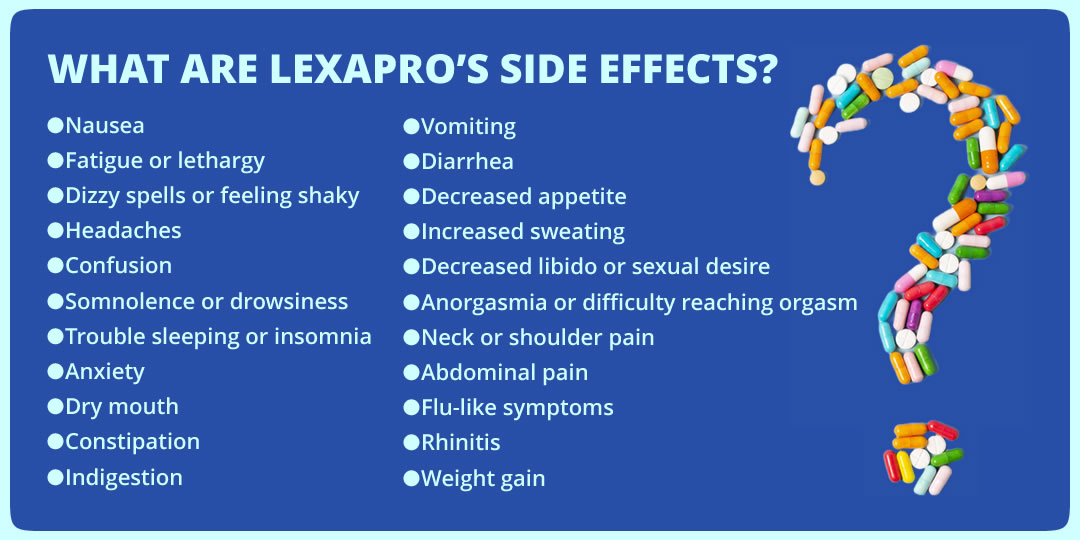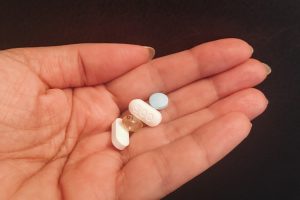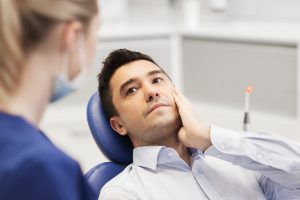Drug side effects may sound alarming; however, they should be expected when taking new medication. This is particularly true during the first couple of days or the first week. In some cases, side effects may persist even if the individual has been taking the medication for some time. Such is often the case with prescription drugs, particularly antidepressants like Lexapro. This article discusses Lexapro side effects first week of usage.
The impact of medication side effects can range from mild inconveniences to severe hindrances that can impact one’s daily life. Understanding that not all side effects necessitate immediately halting medication intake is vital. It all depends on the severity of the adverse effects and the person taking the drug. In many situations, the benefits of a particular medication can greatly outweigh its minor and temporary side effects. Read on to know more about Lexapro side effects first week of usage.
Common Lexapro Side Effects First Week of Dosage
Patients may experience some side effects after taking Lexapro that are similar to most adverse effects associated with other antidepressants and SSRIs. However, note that the adverse effects experienced by two people taking Lexapro may differ, as the drug may interact differently with their brain and body. Many Lexapro side effects from the first week or two of treatment go away on their own as the treatment continues.

The most common Lexapro side effects first week of dosage may include:
- Nausea
- Fatigue or lethargy
- Dizzy spells or feeling shaky
- Headaches
- Confusion
- Somnolence or drowsiness
- Trouble sleeping or insomnia
- Anxiety
- Dry mouth
- Constipation
- Indigestion
- Vomiting
- Diarrhea
- Decreased appetite
- Increased sweating
- Decreased libido or sexual desire
- Anorgasmia or difficulty reaching orgasm
- Neck or shoulder pain
- Abdominal pain
- Flu-like symptoms
- Rhinitis
- Weight gain
Lexapro side effects in the first week are generally the same for both men and women. However, the side effects that adults and children experience are often different. Lexapro side effects during the first week of intake for children and teenagers over 12 years old may also include the following:
- Nosebleeds
- Increased thirst
- Urinary retention or difficulty urinating
- Heavy menstrual periods
- Slower growth
- Weight change or weight loss
- Decreased appetite
- Agitation or abnormal increase in muscle movement
Lexapro side effects during the first week of treatment are generally mild; they typically subside without further medical help. However, you should report to a medical professional if the adverse effects persist beyond the first couple of weeks.
Serious Side Effects of Lexapro
In most cases, Lexapro’s side effects in the first week are mild. However, there are cases in which more serious adverse effects are observed.
Lexapro treatments can potentially cause panic attacks. In addition, patients with a mental health history of bipolar disorder or mania have a higher risk of entering hypomania or a manic episode due to taking Lexapro. The drug may also cause hyponatremia or low blood sodium levels and angle-closure glaucoma, leading to blindness in only a few hours.
Patients who exhibit this adverse effect are often elderly or geriatric. Due to their age, such conditions can have much more severe health consequences. In addition, they are also at risk of experiencing liver problems due to Lexapro.
Below are other severe side effects to watch for when taking Lexapro:
Suicidal Thoughts or Actions: Taking Lexapro may increase a patient’s suicidal thoughts, leading to a higher risk of suicidal actions. This particular side effect is more likely among children, adolescents, and young adults. This is partly why Lexapro dosage and indications for children and teens are still limited.
The increase in suicidal thoughts and actions typically happens within the first couple of months of Lexapro treatment rather than within the first week. The risk also goes up when patients increase their prescribed dosage. Some symptoms of greater suicidal risk are:
- Greater impulsivity, particularly toward dangerous activities
- Aggressive actions or violent tendencies
- New or worse depression
- New or worse anxiety and panic attacks
- Unusual or risky behaviors
- Panic attacks
- Mood swings
Severe Allergic Reactions: Some patients may experience severe allergic reactions after taking Lexapro. This may be due to the drug or other medicine ingredients. For example, individuals allergic to Celexa (citalopram), another antidepressant, will also experience a severe reaction to Lexapro.
Symptoms of severe allergic reactions to Lexapro include:
- Difficulty breathing
- Trouble swallowing or talking
- Swollen face, lips, tongue, throat, or eyes
- Severe skin rash or hives
- Itchiness
- Peeling skin
- Blisters
- Fever
- Joint pain
Seizures or Convulsions: Cases of convulsions have been observed during Lexapro clinical trials. Similarly, once the drug was made publicly available, rare grand mal seizures were included in postmarketing reports. Patients with a history of seizures and nervous system disorders are cautioned against taking Lexapro. The treatments can potentially worsen their existing condition and put them at a higher risk of experiencing convulsions and seizures as a side effect.
Severe seizures may also result from drug interactions of taking escitalopram with monoamine oxidase inhibitors (MAOIs), such as Marplan, Zyvox, or Nardil.
Serotonin Syndrome: Serotonin toxicity is perhaps the most severe among all potential Lexapro side effects in the first week of treatment. Serotonin syndrome is a severe condition caused by excessive serotonin. Although serotonin is necessary for the body to function optimally, dangerously high hormone levels can be fatal. The following signs and symptoms characterize serotonin toxicity:
- Shivering
- Goosebumps
- Diarrhea
- Confusion
- Agitation or restlessness
- Hallucinations
- Insomnia
- Muscle rigidity or severe muscle tightness
- Loss of muscle coordination
- Rapid heart rate
- High blood pressure
- Heavy sweating
- Fever
Seizures and tremors: Severe cases of serotonin toxicity are marked by equally more serious symptoms. Fevers are higher, the heartbeat becomes irregular, and seizures and tremors worsen. In some cases, the patient may faint or become unconscious.
Upon recognizing these signs, patients are advised to call for help and seek immediate medical attention.
Lexapro Side Effects on Women
Although Lexapro’s side effects in the first week are generally the same for both men and women, there are a few exceptions.
Gestating women, particularly those already in the last trimester of pregnancy, may experience unique side effects due to Lexapro. Most of these adverse effects concern the baby rather than the mother. The prescription does not cause premature birth or any birth defects. However, it can increase the baby’s risk of being born with poor adaptation or pulmonary hypertension.
Mothers who just gave birth and women who are nursing babies are advised against taking Lexapro as escitalopram can be transferred into breast milk. When ingested by the infant, it can cause restlessness, agitation, sedation, or issues with gaining weight.
Lastly, Lexapro may cause heavy menstruation. This side effect may affect adults, adolescents, and preadolescents alike.
Lexapro Side Effects on Men
Sexual dysfunction is one of the common Lexapro side effects in the first week. This typically manifests by way of decreased libido or sexual performance. Unfortunately, such symptoms and adverse effects often persist as long as the patient takes Lexapro.
Among men, these adverse sexual effects may also include erectile dysfunction. It is relatively common for men taking Lexapro to experience the inability to have an erection or difficulty keeping one. They may also experience ejaculatory delay or impaired ejaculation.
Patients are advised to consult a healthcare professional regarding such side effects. The doctor may adjust the dosage or change the prescription in cases with significant adverse effects.
Coping With Lexapro Side Effects
Lexapro side effects in the first week of treatment will typically subside on their own as the patient’s body adapts to the new medication. However, there are instances where even common side effects may be intolerable for the patient.
Below are tips to help patients combat some Lexapro side effects in the first week:
For nausea: Take the medication with food and drink plenty of water and other fluids throughout the day.
For increased appetite and weight gain: Temporarily cut back on sweets and sugary drinks. Eat more low-calorie yet nutritious food like fruits and vegetables while avoiding unhealthy foods or saturated fats.
For fatigue and drowsiness: Engage in regular physical activity or exercise. If the physician approves, take Lexapro before bedtime instead of in the morning.
For insomnia: If the doctor agrees, take the medicine in the morning. Avoid coffee and other caffeinated beverages or food in the afternoon and evening.
For dry mouth: Be mindful about breathing through the nose. Sip water regularly and avoid caffeinated drinks and alcohol.
For constipation: Eat plenty of fiber-rich foods like fruits and whole grains. In addition, drink more water and take a doctor-approved fiber supplement.
For anxiety: Increase physical activity or exercise. Yoga is recommended as it helps patients practice meditation and relaxation techniques.

Frequently Asked Questions
Yes, Lexapro may cause greater anxiety during the first weeks of treatment. However, this side effect is typically mild and can be managed with more exercise and relaxation techniques.
Confusion, dizziness, weakness, and sleepiness are four of the first week’s most common Lexapro side effects. However, these adverse effects are generally considered normal and not a cause for concern.
If these symptoms or feelings persist beyond the first week or two, consult the prescribing doctor.
Yes, it can. Like other depressants, specifically SSRIs, Lexapro can cause anxiety to worsen before patients start to feel the effects of increased serotonin in their brain.
Yes, it can. Lexapro can cause fatigue, lethargy, sleepiness, and weakness. In some cases, the feelings of extreme tiredness may stem from other side effects, such as insomnia or trouble sleeping.
Lexapro starts to work as soon as the body metabolizes the drug. The onset of the effect can start in a matter of hours as the medication influences the brain’s function and serotonin levels. However, patients may start to see or feel the results later. In most cases, patients report feeling the effects of Lexapro after four weeks or a month of treatment. However, some patients report noticing the effects after six weeks have passed.
The difference in when people notice the effects of Lexapro may be due to the placebo effect or to how each individual’s body reacts to the medication.
Insomnia due to Lexapro intake does not usually last long. Patients can expect the side effect to subside after the first two weeks of treatment. However, if Lexapro-induced insomnia lasts for several weeks, it is best to consult the prescribing doctor.
Do I need to stop? Anxiety is a common Lexapro side effect in the first week. However, there is no need to stop taking Lexapro unless a doctor orders it. Never stop using Lexapro without first consulting the prescribing physician.





